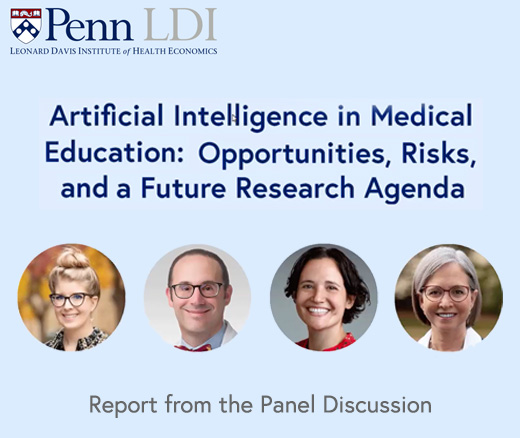
New National Study Finds Doctors Paid Less for Treating Black and Hispanic Patients
Physicians Were Paid About 10% Less for Visits Involving Black and Hispanic Patients, With Pediatric Gaps Reaching 15%, According to a First-of-Its-Kind LDI Analysis
Population Health
Ravi Parikh, MD, MPP, LDI Senior Fellow and Assistant Professor at the Perelman School of Medicine has been named the National Academy of Medicine (NAM) 2023-2024 Gilbert S. Omenn Fellow. The prestigious fellowship is designed to recognize and support early-career physician scientists who are engaged in studies combining biomedical research, public health, and clinical medicine.

Parikh is Associate Director of the Penn Center for Cancer Care Innovation and Director of the Penn Human-Algorithm Collaboration Lab, a multidisciplinary laboratory focusing on developing and testing artificial intelligence (AI)-driven clinical decision support interventions in healthcare.
As an Omenn fellow, Parikh will participate actively in the health- and medicine-related study processes of the National Academies of Sciences, Engineering, and Medicine, promoting the integration of public health and medicine—both scientifically and through practice and policy.
The Omenn award, which is part of the NAM Fellowships for Health Science Scholars program, is named for Gilbert S. Omenn, MD, PhD, Director of the Center for Computational Medicine, and Bioinformatics (CCMD) and Professor at the University of Michigan Medical School. His distinguished career bridges biomedical research, public health and public policy, and academic medical center leadership.
A Staff Physician at the Corporal Michael J. Crescenz VA Medical Center, Parikh is a practicing oncologist with expertise in delivery system reform and informatics. His work has focused on the use of health technology to improve routine patient care, quality of life and survivorship care in oncology, and payment reform for advanced illnesses.
Parikh is a graduate of Harvard Medical School, Harvard College, and the John F. Kennedy School of Government. He completed a residency in internal medicine at Brigham and Women’s Hospital and a fellowship in Hematology and Oncology at the University of Pennsylvania. He has received the National Palliative Care Research Center Kornfeld Scholars Award, Conquer Cancer Foundation Young Investigator Award, and the American Medical Association (AMA) Foundation Excellence in Medicine Leadership Award.

Physicians Were Paid About 10% Less for Visits Involving Black and Hispanic Patients, With Pediatric Gaps Reaching 15%, According to a First-of-Its-Kind LDI Analysis

A New Review Finds Hospital Mergers Raise Prices Without Improving Care, and Urges Regulators to Stop Accepting Quality Claims to Justify Consolidations

CMS’s Main Risk Adjustment Method Underestimates Rural Patients’ Health Risks, LDI Fellows Show, Potentially Reducing Access to Care in the Heartland

Experts at Penn LDI Panel Call for Rapid Training of Students and Faculty

A Proven, Low-Risk Treatment Is Backed by Major Studies and Patient Demand, Yet Medicare and Insurers Still Make It Hard To Use

New Study From LDI and MD Anderson Finds That Black and Low-Income, Dually Eligible Medicare Patients Are Among the Most Neglected in Cancer Care